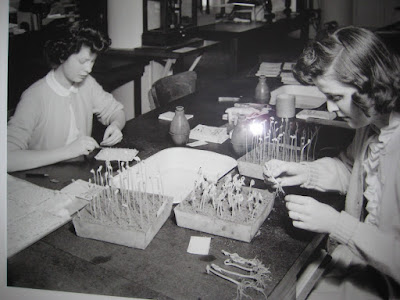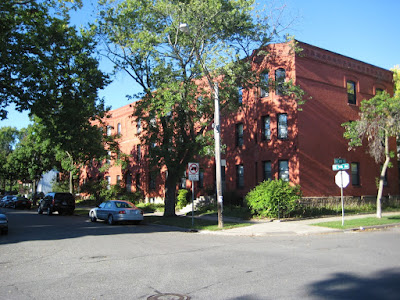I
guess she could best be described as this mirage I can’t get out of my head. But
not really! And homage is probably a bit overblown for someone I hardly even
knew. Nevertheless, Gladus (last name unknown) was one of those iconic figures
that came into my life for a very brief period of time then disappeared just as
quickly.
She
was a woman far removed from my social-economic-educational background and
career aspirations. Yet for some strange reason during those early cold months
of March and April, we connected on a level quite different from my old
romantic entanglements that I used to bench-mark as true love.
Even
though she was ten years older than me, I found in Glady a kindred soul on a
level I hadn’t experienced before with other women. The sad thing was that
Glady had dried up and aged well beyond her years. Her eyes were a sometimes
sad brown and there was a hint of early onset gray in her hair. It didn’t help
that she favored thin cotton sweaters, even in the summertime, and thought of
herself as long past a favorite with the boys.

It
was spring of 1967. I had just returned from my short expat life in Europe. I
was living in a depression era hovel on University Avenue, driving a used VW
and had just started my first real job as a writer at the Minnesota Department
of Public Health on the University of Minnesota Minneapolis campus.
Glady
was the first woman who made me feel mature. She was attractive even for a
middle-aged matron and we could talk easily about almost anything and
everything. The problem was that in our office setting it was always awkward for
casual chats under the constant radar of our boss, the notorious Dr. Marie
Ford. Dr. Ford, was always on the lookout for fraternization among the troops.
On
the University campus, Marie Ford had a storied history as the wife of a
renowned college professor. She would occasionally talk about their life,
living in Prospect Park, attending University functions and traveling with only
the most accomplished of other college couples. It was after the war and the
University was a buzz with ex-service men anxious to get a good education and
ready to absorb all the information her husband could throw at them.
Marie
had a stellar career in public health and held her own prominent place within
their circle of intellectual health professionals. She and her husband were one
of the post-war golden couples at the University.
Sadly,
by the time I arrived on scene in early 1968, Marie’s husband had long since
passed away. Marie had become an old, tired, chain-smoking relic of an era long
since passed. She seemed to regret its passing and, almost like Glady, she had
seen her future slowly come into focus. Both knew what the next decade held
instore for them. An enthusiastic, energetic young man suddenly in their midst
didn’t help when thinking about the future.
The
fact that Glady was ten years older than me didn’t seem to matter to either one
of us but our background did. Glady had grown up in a world totally different
from mine. I was from tony Highland Park. She was from Northeast Minneapolis.
Around
the turn of the century, the community of
Northeast Minneapolis began to grow
as an ethnic enclave supplying workers for the factories that lined Central
Avenue and batched them in clusters throughout the neighborhood. There was a
strong Eastern European influence in religion, social standing in the community
and family obligations.
I
knew little about Glady’s background growing up other than she had graduated from
high school in NE Minneapolis and gone to work immediately. Like almost all of
the young women her age, Glady still lived at home with her mother and would
eventually became her mother’s primary care giver. There was never any thought
as to her moving out and living on her own.
Her
Eastern European roots and upbringing meant she was locked into a lifestyle she
couldn’t break away from, even if she wanted to. It was understood that she would
never leave home until both her parents had passed.
And
I thought to myself: what then with little education and marginal secretarial
skills? Glady was probably destined to spending the rest of her life in the
secretarial pool at one University department or another.
In
retrospect after reflecting on our casual verbal encounters, I think perhaps
Glady was living her life vicariously through my many inane, sometimes sophomoric
antics with fellow hippies, college dropouts and wandering young adults still
unsure of themselves and their future endeavors. I remember she asked me a lot
questions about living in Europe, my time in the service, who I was dating and
other general ‘get to know you’ probes. She seemed to really care and that just
fed my expanding ego.
One
Monday, Glady told me in confidence that she had gone to the Triangle Bar and
thought she might run into me there because I had talked about it so often. It
never occurred to me that her venturing so far from her comfort level was
anything other than a bar visit. What were her real intentions, if any, I have
no idea?
I
only lasted about a year and a half at the Health Department before getting my
dream job at KTCA and ‘getting out of Dodge.’ I never saw Glady again. Her
image and memory slowly faded away until some fifty years later when Sharon
began taking art classes in Northeast Minneapolis. Once again I found myself in
the neighborhood where Glady used to live.
But
this time it was different than in 1968. Fifty years after the West Bank of the
University of Minnesota harbored the disenfranchised, the hippies and other
malcontents of a similar ilk; their decedents had now migrated to the Northeast
part of Minneapolis. In an unplanned, almost organic metamorphosis of a
cityscape, this unwashed morass of creativity had moved west. Old Nordeast, an
eclectic enclave of blue-collar Eastern European nationalities, has become the
new West Bank. It felt like Deja-vu all over again.
As
I once again drove past those tired old dilapidated houses in a neighborhood
with a church on every corner, I thought about Glady and whatever had become of
her. It wouldn’t be much of a stretch to assume she continued on as a secretary
at the University and eventually retired to her mother’s home in NE. Perhaps she became the classic ‘church’ lady
or ‘cat’ lady and lived out the rest of her life as her heritage had dictated.
There’s
a part of me that would love to believe that she finally found someone, after her
mother passed, and she created a new life for herself outside of the drab,
dreary lifestyle handed down to her by past generations. I guess I’ll never
know. But I can imagine.
Of
course, I’ve already outlined a story about Glady. It could be a play, a novel
or a short story. It involves a man much younger than her. They fall in love
but things don’t turn out as they had planned. The story is, at once, happy and
sad, poignant yet realistic. A slice of life that might have occurred in a tired
old building on the University of Minnesota campus between two lost souls; each
seeking clarity in their patchwork lives.
















1 comment:
Another great blog and play idea.
Post a Comment